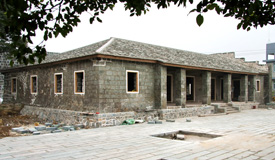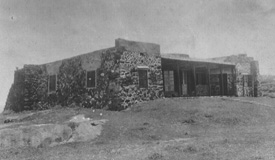|
 |
 |
|
The renovated club (ZHOU XINJIAN) |
The club in Kuling in 1915 |
Wu Qimin, 44, Deputy Director of the International News Department with People's Daily, was assigned to cover Gardner's tour in August 1992. "It was my first business trip. We spent six days together in Beijing and Fuzhou. Mrs. Gardner was really nice," she recalled.
According to Wu, Elizabeth brought Milton's photos and the envelope with the Kuling postmark, climbed the hills to overlook the Minjiang River and met with her husband's childhood friends, all of whom were in their 90s.
Wu told the Gardner brothers that the Summer House, the first Western-style villa in Kuling, "looks better than 20 years ago."
No. 10 Yixia Village in Kuling is a two-story grey stone house where Guo Xiangshu, 75, and his wife Guo Shuzhen, 70, lived for decades. Located along the 800-meter-long old street, the structure was built by Guo's grandfather in the late 19th century.
"There used to be a bookstore and a photo studio right opposite to my house," Guo said, pointing to a site now under construction. "We kept some porcelain plates left by foreign neighbors, and Kodak film advertisement plates, too," he continued.
Before retirement, Guo worked in a local steel mill for 38 years. The only route linking the mill to his mountain home was a walkway with more than 3,000 steps, giving him little ability to return home except for weekends.
The infrastructure in the village was upgraded after the founding of the People's Republic of China in 1949. Electricity, tap water and communication signals became available for Guo and his neighbors.
"We have wider roads, so the traffic from downtown is easier," Guo said.
Unlike Guo, 70-year-old Wei Jian lives in downtown Fuzhou but spends the summertime at an apartment in Kuling Summer Resort every year. To avoid the intense summer heat, he stays indoors to write a book about the area.
Wei started his career as a Chinese-language teacher in a middle school. It took him a decade to finish The Grand Gushan Mountain, The Yongquan Temple. Published by Haifeng Publishing House last year, the 900,000-word book covers topics ranging from history, geology, architecture to religion, literature and tourism. It was dubbed "the encyclopedia of the Gushan Mountain."
"As a Fuzhou local, I love Kuling and its surrounding areas. So when I was asked to write a journal in 1995, I did not hesitate a second," Wei told Beijing Review. "I hope my book could help maintain its legacy."
During his decade-long field research, Wei witnessed the changes in Kuling. Illegal constructions were removed. Local villagers were relocated to new houses. The renovation project for the area's original architecture—including the post office, the first villa, the church, the club and the swimming pool—was finally finished.
In fact, the Kuling renovation project was initiated in the late 1980s. According to Wu Zhihui, Director of Jin'an District Tourism Bureau, the district government has compiled a blueprint for the area's development, with an aim to make it a national tourist destination. Some 36 million yuan ($5.5 million) has been invested since 2009 in infrastructure and renovation projects.
In February, Vice President Xi Jinping shared Elizabeth Gardner's story during his visit to the United States, illustrating the potential for deepened friendship between the two countries.
Two months later, archaeologist David Morse in Fuzhou's sister city Tacoma, Washington State, was asked by the Fuzhou local government to find the Gardners. Unfortunately, childless Elizabeth passed away in 2011, so Morse reached Gary and Lee, who happened to share ancestors.
The Gardner brothers were excited to have their second Fuzhou trip realized. Before departing, they digitalized family albums and diaries.
Similar to the Gardners, Sallie Parks is a descendent of Thomas Rennie, owner of Kuling's first villa. Her husband, Alden E. Matthews, worked in Fuzhou as a missionary from 1947 to 1950 and had a residence in Kuling.
Upon reaching the villa, Parks placed her hands on the exterior walls.
"My husband would speak the Fuzhou dialect whenever we ran into Chinese people in Florida," Parks said. "He said Kuling is a great place, and it really is. I can't wait to tell friends and people around the world how beautiful it is."
Email us at: chenran@bjreview.com | 